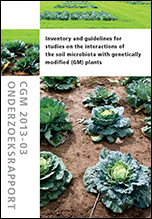Inventory and guidelines for studies on the interactions of the soil microbiota with genetically modified (GM) plants
The analysis of putative effects on the soil ecosystem is part of the risk assessment that is carried out whenever a market authorisation for cultivation of a genetically modified (GM) crop is requested. An important aspect of the risk assessment is whether the GM crop could adversely affect the soil ecosystem, as its life support function may not be impaired.
COGEM and the GMO Office commissioned a research project to get an overview of the methods that can be used to determine composition and variability of the soil microflora, and how these methods may be used in risk assessment. The research report provides an overview of research methods, information about their strengths and weaknesses and their potential application in the risk assessment of GM crops and is a useful tool for risk assessors and applicants. The described research methods constitute an advanced ‘toolbox’ that may be used in the different steps of the so-called ‘tiered approach’ used in risk assessment.
COGEM concludes that there is no reason to change the foundations of the current risk assessment approach. Based on the traits that are currently introduced in GM crops no effects on soil microflora are expected. Due to the diversity in potential future GM crops and introduced traits, and the limited knowledge on variation in soil microbial communities, the current case-by-case approach remains necessary. If there is a reason to expect a risk or harm to the life support function of the soil ecosystem the different steps in the risk assessment approach should be followed and the new advanced methods that are described in the research report may be used to analyse whether the GM crop affects the soil microflora.

